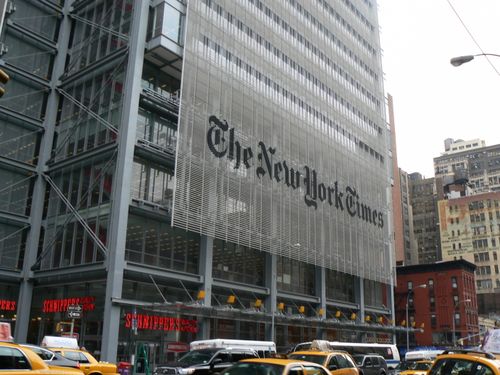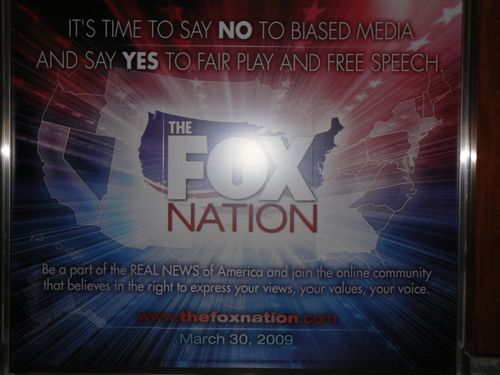Wednesday 1 April 2009
New York
In the world hierarchy of daily newspapers the New York Times considers itself the equal of any. It is the largest metropolitan newspaper in the US and is part of a stable of 18 newspapers including the International Herald Tribune and The Boston Globe.
We hear the views of the senior editorial team and the business managers about the 24 hour information age and how a global newspaper competes.
Editions of the NYT are being printed at over 34 sites around the world. The day starts in Asia, moves to Europe and then the US that is obviously reflected in the different editions the newspaper produces.

They see their role as to enlighten society through accurate information. It is a refreshing attitude and again another conundrum is highlighted when we are informed that there is no press complaints commission or other independent body people can complain to about newspaper coverage in the states.
They say the NYT takes complaints seriously and they have their own internal mechanism to deal with them and publish a regular corrections section.
We have talked a lot in the UK about the need for newspapers to give people prior notification of a story that concerns them. As there is no legal mechanism to restrain a publication in the US they see no reason not to give prior notification to the subject of a story.
They also view website comments differently and see it as their duty to vet comments for approval before being posted – this from the newspaper with the most viewed newspaper website in the world and with the most comments.
Our next meeting was with the News Corporation, Rupert Murdoch’s empire of TV, newspapers and other broadcasting platforms around the world.
Given the right-wing nature and content of Fox News in the States and the Sun newspaper in the UK there was some amusement at the screen in the lobby declaring political balance.

Our hosts are the senior lawyers for News Corp and our discussions cover ethics and processes. Again there is a strong defence of the US system and the case was made that as US law protects the publisher it assists the uncovering of wrong doing by powerful or wealthy individuals.
I am drawn to this point of view but I have one tiny, although very important doubt. I keep asking myself what about the reputation and livelihood of an individual whom a newspaper or broadcaster adversely affects and their lack of finance to correct what has been put in the public realm.
It’s great when a Nixon is found out for lying, a Clinton uncovered for ‘not having sex with that women’, or a Bush for protecting members of the Bin Laden family. It’s not so good for the ordinary man or women in the street who gets caught up in a media storm and subsequently losses their livelihood despite having committed no crime. They have neither the resources nor the contacts to undo the damage to their lives. With the development of no win no fee arrangements in the UK, in theory at least, they might get a correction, an apology and even some compensation. From what I can deduce in the US they would stand no chance at all.
Onto the court house and a meeting room overlooking the holding penitentiary where the alleged $50 billion investment fraudster Mr Bernard Madoff is being held. It is claimed that we may be able to see him if he decides to look out of the window in his cell.
Our meeting is with Judge Robert Sack, US Circuit Judge of the US Court of Appeals and the author of several books on libel law.
His view of the conundrum of tougher libel law in the UK not leading to more responsible publishing is cultural, and the same conundrum that leads to different states within the US having different laws. Again it is the First Amendment to the US constitution that gets mentioned almost as if it is some cultural icon of American that in truth has no equivalent in English law. Not even article 10 of the European Convention that supposedly guarantees free speech can be said to match the eloquence and widespread understanding of the 1st Amendment.
Our final meeting of the day is held at the British Consulate on Third Avenue where we question the award winning investigative reporter Craig Unger. His book ‘House of Bush, House of Saud’, was not published in Britain allegedly because UK publishers dropped it due to concerns about being sued in the UK courts by some of the books subjects.
He was the journalist who drew attention to the links between the Bush and Bin Laden family that was featured in Michael Moore’s film Fahrenheit 9/11.
We discuss freedom of speech and for the first time hear a mild criticism of the US system, but it is only in respect of his view that the US media has too cosy a relationship with the White House.
I’m still getting lots of calls from UK media – local and national, all adding to my mobile phone bill, that the same media will complain about when it is published in 12 months time!
Most are about the digital switchover, empty shops in Torquay, or parliamentary questions tabled last week. None are about allowances.
I talk down the empty shops story when the national media ask questions as I don’t think it helps to associate our town centres with failure, not least because there are other failing town centres in areas that don’t have tourism as one of their primary industries. On the other hand I don’t hold my punches if the media is local as our local decision makers could do much more to help struggling small businesses and locally owned shops.
Ate in a great diner a few doors down from the Hotel. Much cheaper than the average Manhattan restaurant, but still a few pounds more than one would expect to pay in central London.
Recent Comments